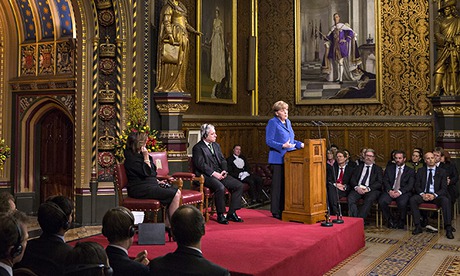Welcome
....to JusticeGhana Group

JusticeGhana is a Non-Governmental [and-not-for- profit] Organization (NGO) with a strong belief in Justice, Security and Progress....” More Details
No special treatment for UK over Europe, says Angela Merkel
- Details
- Parent Category: Africa and The World
- Category: DateLines
- Created on Thursday, 27 February 2014 00:00
- Hits: 3775
 No special treatment for UK over Europe, says Angela Merkel
No special treatment for UK over Europe, says Angela Merkel
German chancellor tells parliament Britain must retain central role in Europe but says patience of EU's other leaders is finite
Nicholas Watt, chief political correspondent
Angela Merkel has pleaded with Britain to remain a strong voice in the EU but said the country cannot expect special treatment if David Cameron embarks on a renegotiation of Britain's membership terms after a Conservative election victory.
The German chancellor opened her speech to a joint session of the UK parliament in English to drive home her message of Britain's central role in the EU, coupled with a warning that the patience of the EU's other 27 leaders with the UK is finite.
MPs and peers laughed as Merkel, who recalled her first visit to London in the spring of 1990 shortly after the fall of the Berlin Wall, said those expecting a "fundamental reform of the European architecture" in Britain's direction would be disappointed.
The chancellor gave little indication whether she would countenance a major revision of the Lisbon treaty – a key Cameron demand to allow him to table his proposals – when she said simply that new eurozone governance arrangements would be introduced through the "necessary legal instruments".
But in the final flourish of her speech, also delivered in English, Merkel said Germany regarded Britain as a vital ally in reforming the EU. "We need a strong United Kingdom with a strong voice inside the EU," she said. "If we have that we will be able to make the necessary changes for the benefit of all."
The speech appeared to be designed to inject a dose of reality ahead of the negotiations, in which the prime minister hopes to introduce widespread reforms of the EU if he wins the 2015 general election. Cameron would then hold an in/out referendum by the end of 2017.
The chancellor made clear that her main priority was to strengthen the euro – by ensuring monetary union was matched by an economic union among eurozone members – with "clear-cut and resilient architecture". This would leave little room for special treatment for one member state.
Merkel told MPs and peers: "I have been told many times during the last few days that there are very special expectations of my speech here today. Supposedly, or so I have heard, some expect my speech to pave the way for a fundamental reform of the European architecture, which will satisfy all kinds of alleged or actual British wishes. I am afraid they are in for a disappointment.
"I have also heard that others are expecting the exact opposite and are hoping that I will deliver the clear and simple message here in London that the rest of Europe is not prepared to pay almost any price to keep Britain in the EU. I am afraid these hopes will be dashed too.
"If what I have been told is true then it will be obvious to everyone that I find myself caught between the devil and the deep blue sea. That is not a pleasant position to be in, at least for a German head of government. Nevertheless, that cannot in any way spoil my pleasure in being here today."
But Merkel made it clear she shared Cameron's objectives to ensure that EU regulation was simplified and that the principle of subsidiarity – that decisions should be made at the lowest possible level – should be re-emphasised.
Speaking in German, she said: "We need to cut unnecessary red tape at the European level that hampers our companies in Germany just as in the UK. We always have to measure up with the best of them in the world. Therefore European rules and regulations need to be subject to regular reviews just as national rules and regulations [do]. Should they prove to be superfluous they have to be scrapped … The principle of subsidiarity needs to be respected more in Europe."
The chancellor reinforced this message with a call for Britain and Germany to remain "united and determined" in reforming the EU and promoting competitiveness. "We, Germany and Britain, share the goal of seeing a strong competitive EU join forces," she said in her final words in German.
Turning to English, she added: "United and determined, we can defend our European economic and social model in the world. United and determined we can bring our values and interests to bear in the world. United and determined we can serve as a model for other regions of the world. This – and nothing less than this – should be our common goal. I regard it as the task for our generation."
Labour said Merkel's speech had brought "warm words, cold comfort" for Cameron.
Source: The Guardian UK




